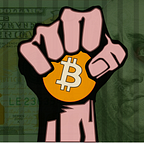Misunderstanding Economics — The “All Or Nothing” Fallacy
I recently explained how Leftism Fails At Basic Economic Incentives. The article shows how taxes and subsidies manipulate economic incentives to affect outcomes. I was encouraged by the lively debate that surrounded the article on Reddit and Medium.
The Response
A common response to the article is actually a misunderstanding of economics and a commission of the All or Nothing fallacy. Let’s see a few examples:
Do libertarians think people choose not to earn income because it’s taxed?
Fundamentally, people don’t choose to be poor on benefits if they can be rich.
The basis of the argument is “Do you really think people aren’t going to work if you tax them?” Or, “Do you really think people are going to be poor on purpose just because they can get government benefits?” Actually, the short answer is, yes! But let’s explain what that means.
The Crux
The crux of the argument is that we’re not talking about any one individual, we’re also not talking about every individual — this would commit the All or Nothing fallacy. But rather:
Economics deals with the statistical distribution of human choices within a system.
The Example
Let’s look at an example. According to Chron.com a crew member on a Dungeness crab fishing boat can make $100,000 in a year. Not bad. But how many people in the world are willing to take this job? The way the economy works is that the general population is given this option and each person performs an individual assessment to decide if they want to take this job. It will depend on the particular requirements of the job, the compensation offered, and the competing job alternatives. Is the compensation sufficient for the personal sacrifices that need to be made?
The Breakdown
For the sake of round numbers, let’s say that 10,000 people decide to take this job in 2016. Now, let’s say that for whatever reason the government decides to add a new 10% tax on all fisherman. In 2017, the take home pay of the crab fisherman will effectively be 10% less than it was the year before. The effect of this is that it will change the personal calculation for all people considering taking this job. Does it mean that all crab fishermen will quit, no? But it does mean that there will be less people that will be willing take the job than when the pay was 10% higher. At the reduced pay version of this job, only 9,500 people may be willing to sign up. There was a certain percentage of people who were “on the edge”. They were uncertain if they wanted to take this job and now that the take home pay has changed, they will decide that the benefits no longer outweigh sacrifices. The fundamental point is that when you change the incentive structure, you alter the overall distribution of choices.
For Real?
Does this really happen? Can changing just one law that adds a tax or or government benefit really effect human choices. Yes sir. In fact, examples of this also surfaced in the response to the article. On Reddit, VictorV wrote:
Ironically, I do.
I skirt the [Alternative Minimum Tax] and I purposefully take days off to reduce bonus pay to slide under the AMT so I don’t pay a redonkulous 35% flat instead of a graduated scale + my deductions.
Economics doesn’t assert that people are lazy, evil, or dumb. Rather it simply explains that if you modify the incentive structure of a system the distribution of human choices will react accordingly.
Want More Like This?
The above is an excerpt from my upcoming book The Great Unlocking: A path to economic, political, and spiritual enlightenment. Sign up below to receive updates when more pre-release content is available.
